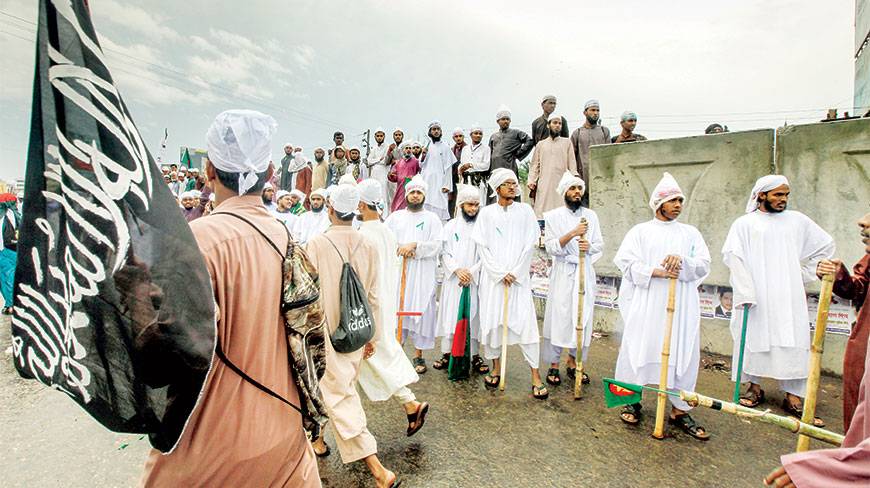Israfil Khosru
We are witnessing a trend that confirms Bangladesh to be a crucial cog of the global terrorist agenda
With the murkiness surrounding the death of Rajshahi University Professor AKM Shafiul Islam, the credibility of the entire investigation process seems to have come under public scrutiny. While Rajshahi Metropolitan Police (RMP) is labelling the brutal hacking to be a well-planned crime implicating members of Jamaat and its student wing Chhatra Shibir, a rather obscure Islamic group called the Ansar al Islam Bangladesh-2 has claimed responsibility for this murder.
Whichever way you look at it, radical elements seem to be at the core of this crime and the signs are rather alarming. With ISIL recruiters getting apprehended in Dhaka, to al-Qaeda announcing its operation in South Asia, it is rather safe to say that we are witnessing a trend that confirms Bangladesh to be a crucial cog of the global terrorist agenda.
So, what makes a country like Bangladesh so inherently susceptible to such an agenda? Furthermore, why are we seeing such a meteoric rise in crimes that point towards religious zealots in recent times?
The notion that the religion of Islam is under threat in Bangladesh is gradually gaining in precedence in last couple of years. In a country that is now supposedly trying to reclaim its secular principles, it is rather puzzling to see a section of a religious majority harbour such a notion.
We have seen a mobilisation by Hefazat-e-Islam, which although being dealt with force in one particular instance by the government cannot be entirely ignored because of its sheer size and propensity to survive and thrive. Crackdown orchestrated on Jamaat and Shibir activists has seen them completely move off the political negotiating table as well.
They have not held a press conference or declared any organised political meetings in recent times due to narrowing political space. Furthermore, with their media platforms taken away, Jamaat-e-Islami as a political party is no longer visible to the public eye, does not have a voice, and hence, is not accountable to the people.
Such a heavy-handed approach by the government can only act to strengthen the underground radical forces by pushing relatively moderate forces to ally with them as well.
Interestingly, a clear correlation can be drawn between religious extremism and shrinking political and civil society space in Bangladesh. Recently, we have witnessed adequate instances that suggest Bangladesh is being used as a base to export terrorism into neighbouring India. Recent visit by National Investigation Agency (NIA) representatives from India involved handing over a list of people who are allegedly tied to the Burdwan blast and distressingly operating out of Bangladesh.
These are ominous signs considering we have a government in place, which has time and again reiterated its conviction in countering national and transnational terrorism by labelling it as one of their prime objectives.
It should be noted that in July 2009, the government formed an eight-member “National Committee for Intelligence Coordination,” with the prime minister as the chairperson, to effectively co-ordinate the intelligence activities of different agencies. The committee was also charged with improving the campaign against extremism through exchanges between law enforcement and intelligence agencies.
Furthermore, in the same year, Bangladesh enacted for the first time, specific legislation designed to combat terrorism: The Anti Terrorism Act 2009. These measures clearly indicate that the government had a firm commitment and genuine political will to combat terrorism, but nearly five years down the line, the situation seems to have worsened.
This is clearly because these so-called initiatives do not address the root of the problem. What makes Bangladesh the fertile breeding ground for terrorists and radical elements is simply the presence of stark deprivation and political alienation that applies to the majority of the population.
When an ideological position is denied a voice, the feeling of disenfranchisement is imminent. Such disenfranchisement eventually leads to radicalism. However, with continuous shrinking of political space, such radical forces tend to grow in size and eventually question the legitimacy of the government in place. In certain cases, they can even thrive and become a government on its own, clearly characterised by the ISIL phenomenon. However, we cannot wait for such an extreme scenario to take shape in Bangladesh.
Without the presence of an inclusive democracy the problem of radicalism cannot be countered. While law enforcing can go on apprehending members of JMB, Huji, JMJB, and various other religious outfits with a radical dimension, the problem of terrorism, at least at a national level is likely to get worse due to the current political landscape.
Radicalism is simply an alternative method of expression. With a single party gradually consolidating power, the conventional methods of expressing various political, religious, and social views are getting further constrained. At this point, the government of Bangladesh, in a bid to solve the problem of terrorism, is compounding it in the long run. Let us just hope that they realise this sooner than later.
Source: Dhaka Tribune

